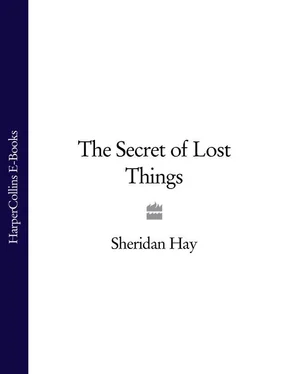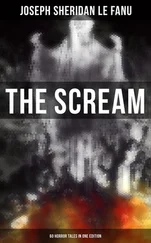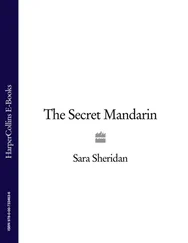“I’m out here, Chaps!” I replied.
“Ah, I wondered, dear,” she said, coming outside. “Lovely here in the garden. What are you doing on your knees? You look as if you’re praying to the flowers.”
“It makes me feel better,” I said, embarrassed. “They look so happy, with their bright faces. They smell like ants, though, these flowers…”
“Nasturtium is their variety, and I’m sure I don’t know what ants smell like.” She raised her eyebrows. “But I’ve no doubt you do.”
The tea kettle whistled and she went in briefly to turn it off and brew the tea.
“I see you have her ashes with you,” she said, coming out with a tray.
Perhaps she considered a talk about the maudlin nature of my attachment to the Huon box, but let it go. She sat down on a wrought-iron chair, after laying the tray on the matching table.
“I’ve something to talk with you about,” she said, growing serious.
“I know what you’re going to say, Chaps.”
“You only think you know,” she said, pouring out two cups.
“You’re going to tell me again that ambivalence is fatal,” I said to the leaf.
She had been saying such things all week.
“You’ll tell me to give sorrow words. You’re going to say that I must choose, decide, begin to make my way. You’re going to suggest I bury these ashes—”
“Well, I certainly would say all those things,” Chaps cut in. “And have said all those things, but that’s not what I have to tell you.”
She sat up straighter, filled with the drama of surprise. She hesitated, then took a deep breath.
“I bought you a ticket today. An airplane ticket. I want no argument about it—I had the money saved. Guess where you’re going?”
I stared at her, unable to answer. Did she want me gone? Was she sending me away?
“Can’t guess,” she said. “I thought it would be easy.”
I was silent.
“You love cities, but the only one you’ve ever been to is Sydney. It’s not to there, so don’t consider that one.”
I couldn’t imagine what she’d done, or what I’d done to want her rid of me. I had no money for school. I had no means to travel. I had nothing, so far as I could see, but her affection for me, a box of ashes, and a black-and-white photograph of someone I had loved more than life.
“Come on, why don’t you guess?”
I couldn’t guess. I had that new, hurtling feeling again, the rapid and unpredictable movement of events coming toward me, like getting into a car after a lifetime spent walking. I thought I’d just stay in Tasmania with Chaps, that she’d teach me the book trade. That I’d live as she did, quietly and in my head.
“I’ve bought you a ticket to…” she paused dramatically, and with an uncharacteristic flourish.
“New York!”
I dropped the leaf, sat back on my heels and, after a confusing moment, burst into tears.
“Now, now. I’m not throwing you out, my dear Rosemary.” Chaps bent across and patted my shoulder, my back. She was awkward with affectionate gestures. Her voice remained firm.
“Out of tears, plans!” she said, and handed me the handkerchief she kept folded and tucked inside the sleeve of her cardigan. I never carried one.
I wiped my eyes and nose.
“There now, dear. If you really think about it you’ll see you’re ready to go. The best is not past. Your mother’s death is a break in your life but your life is not broken. You can mend it by living it, by living a different life than either you or your mother imagined.”
“I have imagined it though, Chaps,” I said, thickly. I had, but I was afraid. More than I’d ever been. “I want to leave and travel. I want to discover things, to know things. But I’m frightened. And now you’ve gone and sorted it out for me. You’ve taken away my excuse.” I blew my nose on her handkerchief.
“I’ve done nothing but make the decision for you about where to start, Rosemary. And that was easy because of your scrapbook, all those pictures of New York, of cities. I thought you must have always intended to go there, making a fetish of the place, collecting up clippings and things since you were small. All I’ve done is give you a push. I’m sure your mother would have done the same thing.”
Chaps herself became a little teary. But she was vehement, too.
“You have to get away, Rosemary. You must go abroad! It’s what I would have done, my girl, in a minute, if I’d had the chance.”
Her filmy gray eyes locked on mine. Chaps could be fierce. “It never came for me, Rosemary. The chance to really make a break, to leave and not look back. Now you must go. You must begin! It’s what your mother would want for you, my dear Rosemary. What I want for you. A larger world. You know now where to start. We’ve a couple of weeks left together to arrange everything.”
New York was a fantasy. It was Sydney multiplied, which was all I could imagine then of a great city from the peculiar vantage of Tasmania. It was true I had kept a scrapbook of images since I was small, and many were of New York, but that fact was secondary to the freedom the pictures represented. Liberation was in the very scale of the city: a goldfish bowl one could never grow to fit. I had postcards of tall buildings sharp against the sky, of the magnificent interiors of train stations and libraries illuminated by slanting shafts of light. Spaces between pictures I had filled with bits of ribbon, buttons, and flakes of colored felt.
I hadn’t consciously imagined traveling to New York, or to any other city but Sydney, while Mother was alive. But Chaps had guessed the shape of my deepest wish: I thought my father lived in a city. I didn’t know where. A place free and anonymous and far away. The opposite of Mother. Father could only be foreign. Unknown and mysterious.
My father was a city; the scrapbook my attempt to make him real. In the absence of an actual photograph, any one of the faceless men in the postcards or newspaper clippings of cities could be him. Many of the images were old street scenes, and Mother used to say, “Look at all the men wearing hats! Those were the days to be in business!”
She never guessed at my real interest—I didn’t know it myself. My father was in a city, any city, and I was collecting evidence, clues to his existence. He had long before suffered a sea change.
As Mother gave me no tangible detail of him to build upon, my fancy was as real to me as any fact. She barely knew him, and what she did know she’d kept to herself, would keep to herself, forever.
How much Esther Chapman did for me, letting me go as she did! As a reader of fables, she must have recognized that I would need one of my own. An antidote to catastrophe. My world had been emptied of all its contents, save her, and she knew a city would be the cure to the small life I had lived, the one I’d lost.
But it was myself I was calling into being.
I arrived in New York late at night, unprepared for a life I only dimly suspected might be found there. A storm caused the plane to land roughly. I never saw my destination; clouds covered the city, the ground visible only moments before the plane’s wheels struck it. I felt myself land hard, as if thrown to earth.
I had three hundred dollars. In my suitcase, underneath my clothes, lay my scrapbook and Mother’s photograph. At the airport, with tears on her cheeks, Chaps had pressed upon me two presents: a green stone necklace (the color of my eyes) which she assured me was an amulet against further heartbreak, and a small book—her very favorite, she claimed—wrapped in her store’s bluish paper. I couldn’t bear to open the package, the Chapman’s Bookshop paper as dear and familiar to me as the wallpaper in my childhood bedroom, in fact, its surrogate. I told Chaps that I would keep her parcel intact, waiting for the day that I desperately needed a present. I didn’t doubt it would come, and for the moment, travel was gift enough. The necklace, though, I put on immediately. A guard against heartbreak couldn’t wait.
Читать дальше












